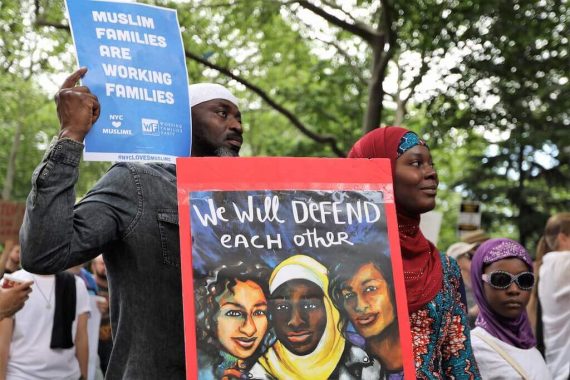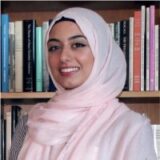November 11, 2001 marked the beginning of an era of American terror – an era of reckless massacre, carpet bombing, pillage and rape, and the use of radioactive weaponry against Muslims in Iraq and Afghanistan. The War on Terror expanded into Georgia, Djibouti, Kenya, Ethiopia, Yemen, Eretria, and programs like extraordinary rendition were active in collaboration with oppressive, tortuous regimes across the Muslim world.
The U.S. government intelligence agencies tapped into foreign government, social circles, and religious networks abroad to mass gather information in pursuit of political and military warfare. Reflectively, the U.S. government organized and executed a discriminatory, racist, anti-Muslim security and surveillance apparatus that (to this day) targets, monitors and entraps Muslims on the basis of their religious identity and practice.
Government programs like the Patriot Act, which Biden has taken credit for establishing the foundation of, greatly expanded the surveillance capabilities of U.S. law enforcement agencies in the pursuit of identifying threats to national security. This was weaponized and translated into the political imprisonment of community leaders like Dr. Sami al-Arian, the first to be charged under the Patriot Act.
As a Palestinian Muslim, he was targeted by the U.S. government for advocating for Palestinian human rights. The targeting of Muslims through discriminatory domestic policy is aligned with America’s foreign policy interests, as seen in the hyper-surveillance and targeting of Palestinians to protect Israel’s (fracturing) hegemony of support in American government and society.

VIDEO: Why the Far-Right is Rising Globally – Future Prospects
Under the Trump administration, the Department of Homeland Security relaunched the Countering Violent Extremism (CVE) program as the Targeted Violence and Terrorism Prevention (TVTP) program. CVE and TVTP trains teachers, mental health workers, imams and others to use faulty social science and racialized indicators to identify those who are supposedly vulnerable to ‘radicalization’ within the Muslim community. The government maps and tracks religious, political, and social activity across Muslim communities.
For example, NYPD agents would document how often Muslims students prayed during school trips, which Egyptian businesses shut their doors for daily prayers, which restaurants would show al-Jazeera, and which Newark businesses sold halal products and alcohol.
According to law enforcement documents, the NYPD post-9/11 eyed and interpreted signs of Muslim religiosity as ‘radicalization.’ For example, NYPD agents would document how often Muslims students prayed during school trips, which Egyptian businesses shut their doors for daily prayers, which restaurants would show al-Jazeera, and which Newark businesses sold halal products and alcohol.
The report Mapping Muslims: NYPD Spring and its Impact on American Muslims outlines how the NYPD surveillance program, as a case study on the impacts of the American surveillance system as a whole, has suppressed religious practice, stifled speech and association, sowed suspicion and distrust, and censored student activists in the Muslim community.
The same report outlines personal testimonies on how Muslims have altered their presentation of their faith in fear of being targeted by law enforcement at school and in their religious spaces and communities. Some noted avoiding growing a beard, wearing the headscarf or niqab, and other public indicators of faith in fear of being targeted. Parents, many of whom come from immigrant backgrounds and witnessed authoritarianism and unchecked power and surveillance in their own countries, also warn their children against presenting ‘too Muslim.’
Sowing Distrust and Fracturing Brotherhood
The surveillance of Muslims and the Muslim community at large is often done through the hiring of informants. Informants are people who are typically already in a position to know or learn information from the target individual or community. They can make up to $100,000 annually, and some are hired in exchange for legal favors; such as dismissing criminal charges or expediting immigration proceedings.
As Muslims are overwhelmingly aware of the heightened surveillance of their communities, many Muslims have admitted to being more hesitant to create new relationships with new members like converts.
Since 2009, paid FBI informants have played a ‘central role’ in nearly 50% of all domestic terrorism cases. The known presence of informants in the Muslim community, both at colleges and mosques, has raised suspicion in meeting new people, the development of political and social programming, and maintaining the unity and trust among community.
As Muslims are overwhelmingly aware of the heightened surveillance of their communities, many Muslims have admitted to being more hesitant to create new relationships with new members like converts, and there is greater suspicion around those who express politically or socially radical views.
Recommended
Political Censorship
Muslims have also reported self-censorship in discussing mainstream political issues among themselves – cafe owners have admitted to refraining from broadcasting Arabic news channels in cafes, and Muslim students admit to altering language, including regular clarifications and qualifiers when discussing current affairs.
To be coerced to speak in a way that would be pleasing to the government or the average American is to shape the very language to causes native to Muslims and Islam – and this will have long-term implications. The neutering of political speech and advocacy creates a ‘controlled opposition’ to racist and imperial domestic and foreign policy. This restricts Muslims from openly referencing how Islam informs our plight for justice and our political, social, and economic actions against injustice.
How are Muslim communities guarding themselves?
In response to the state targeting religious spaces and networks, numerous human rights and civil rights organizations have emerged in educating and advocating for the Muslim community. Organizations like the Center for Constitutional Rights, CLEAR, the Coalition for Civil Freedoms, the Muslim Legal Fund of America, CLCMA, and CAIR provide educational and legal resources to equip mosques, student organizations, religious centers, and individuals to protect themselves and their communities.
Muslims and Muslim organizations continue to organize and mobilize against the injustice inflicted upon our communities and families domestically and abroad, while facing backlash from the government, U.S. allies, and non-government actors; all invested in the Islamophobia industry and the hindrance of a united Muslim society in the U.S.
In attempting to fracture our communities, sow distrust and suspicion, and censor our political and religious language – the government is recognizing brotherhood and dialogue as the most powerful tools for organizing our community. To continue to build strong relationships with one another and engage in creative and honest discussion on the issues that plague us locally and nationally, internally and externally, is what will protect and strengthen the Muslim community from the act of terror that is government surveillance in America.





